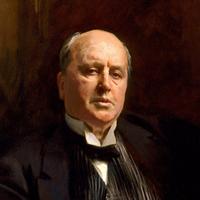Chapter III
At Nice once, toward evening, as the pair rested in the open air after a walk, and looked over the sea at the pink western lights, he said suddenly to his comrade: "Do you like it, you know - being with us all in this intimate way?" "My dear fellow, why should I stay if I didn't?" "How do I know you'll stay? I'm almost sure you won't, very long." "I hope you don't mean to dismiss me," said Pemberton. Morgan debated, looking at the sunset. "I think if I did right I ought to." "Well, I know I'm supposed to instruct you in virtue; but in that case don't do right." "'You're very young - fortunately," Morgan went on, turning to him again. "Oh yes, compared with you!" "Therefore it won't matter so much if you do lose a lot of time." "That's the way to look at it," said Pemberton accommodatingly. They were silent a minute; after which the boy asked: "Do you like my father and my mother very much?" "Dear me, yes. They're charming people." Morgan received this with another silence; then unexpectedly, familiarly, but at the same time affectionately, he remarked: "You're a jolly old humbug!" For a particular reason the words made our young man change colour. The boy noticed in an instant that he had turned red, whereupon he turned red himself and pupil and master exchanged a longish glance in which there was a consciousness of many more things than are usually touched upon, even tacitly, in such a relation. It produced for Pemberton an embarrassment; it raised in a shadowy form a question - this was the first glimpse of it - destined to play a singular and, as he imagined, owing to the altogether peculiar conditions, an unprecedented part in his intercourse with his little companion. Later, when he found himself talking with the youngster in a way in which few youngsters could ever have been talked with, he thought of that clumsy moment on the bench at Nice as the dawn of an understanding that had broadened. What had added to the clumsiness then was that he thought it his duty to declare to Morgan that he might abuse him, Pemberton, as much as he liked, but must never abuse his parents. To this Morgan had the easy retort that he hadn't dreamed of abusing them; which appeared to be true: it put Pemberton in the wrong. "Then why am I a humbug for saying I think them charming?" the young man asked, conscious of a certain rashness.
"Well - they're not your parents." "They love you better than anything in the world - never forget that," said Pemberton. "Is that why you like them so much?" "They're very kind to me," Pemberton replied evasively. "You ARE a humbug!" laughed Morgan, passing an arm into his tutor's. He leaned against him looking oft at the sea again and swinging his long thin legs.
"Don't kick my shins," said Pemberton while he reflected "Hang it, I can't complain of them to the child!" "There's another reason, too," Morgan went on, keeping his legs still. "Another reason for what?" "Besides their not being your parents." "I don't understand you," said Pemberton. "Well, you will before long. All right!" He did understand fully before long, but he made a fight even with himself before he confessed it. He thought it the oddest thing to have a struggle with the child about. He wondered he didn't hate the hope of the Moreens for bringing the struggle on. But by the time it began any such sentiment for that scion was closed to him. Morgan was a special case, and to know him was to accept him on his own odd terms. Pemberton had spent his aversion to special cases before arriving at knowledge. When at last he did arrive his quandary was great. Against every interest he had attached himself. They would have to meet things together. Before they went home that evening at Nice the boy had said, clinging to his arm:
"Well, at any rate you'll hang on to the last." "To the last?" "Till you're fairly beaten." "YOU ought to be fairly beaten!" cried the young man, drawing him closer.

